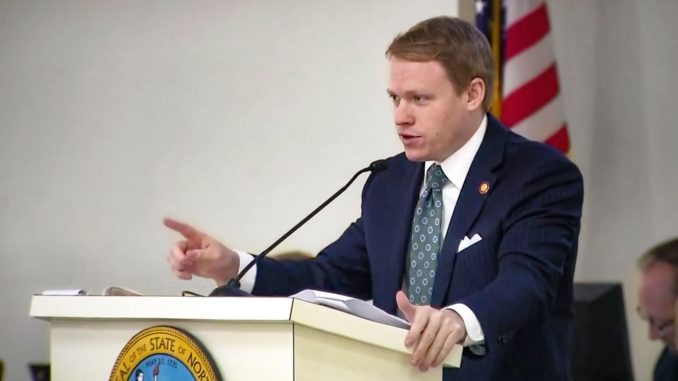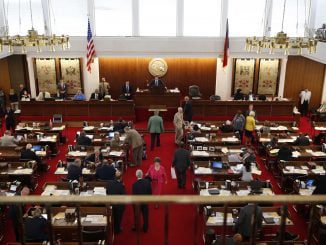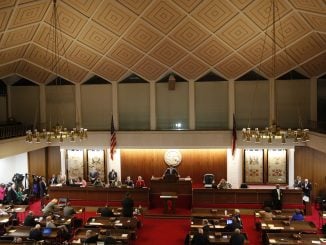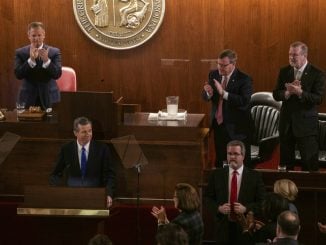
RALEIGH — Entering his third term, 33-year-old Rep. Destin Hall (R-Caldwell) is one of the youngest members of the General Assembly to enter the top echelon of N.C. legislative leadership, this after being chosen to chair the powerful House Rules Committee, the first millennial to hold such a high office in either legislative chamber.
Hall’s role as chair of both the House Committee on Redistricting and House Rules Committee makes him part of a leadership triumvirate in the House with Speaker Tim Moore (R-Kings Mountain) and Majority Leader John Bell (R-Wayne).
North State Journal sat down with Hall recently and talked to him about upcoming COVID-19 related legislation and the Emergency Powers Act.
COVID-19 legislation
Hall’s current focus has been on getting students back in school and parents back in the stands to watch their children compete in sporting events. Near the end of February, Hall co-sponsors House Bill 128, which seeks to expand access to K-12 school and university sporting venues.
“First of all, the bill essentially allows the local boards and also UNC system schools to have up to 50% occupancy at their games, but it sets a floor of 20%. They can’t go below that at all,” said Hall of the bill.
Senate Bill 127 was introduced on Feb. 23, and as of March 15, it has made its way to the Senate and currently sits in the Senate Rules and Operations Committee.
“We are hearing that the governor has seen what we’re filing here, and some other bills that have been filed in the General Assembly, and he also sees the cases in North Carolina of COVID, and across the country, are dropping precipitously,” Hall said. “There’s no reason that these limits should not be increased at this time.”
The governor apparently did see that legislation and dropped an executive order on Feb. 24 easing a few of his COVID-19 restrictions, including sporting attendance; however, his order was far less than that of Senate Bill 127. Cooper limited outdoor sporting events to 30% of a facility’s stated fire capacity or seven guests for every 1,000 square feet. Cooper’s order limits indoor sporting facilities to 30% of the stated fire capacity with a maximum of 250 people allowed in each indoor room or space being used.
Along with getting kids back into schools, addressing students at risk for academic failure as a result of remote learning during the pandemic is also front and center for Hall, who is a co-sponsor of House Bill 82, titled Summer Learning Choice for Families.
Emergency Powers Accountability Act
When asked about Cooper’s long line of executive orders and the impact they’ve had on the state, Hall said, “I don’t think anybody really thought that the governor had the ability to shut down the entire state for as long as he’s done that.”
“The Emergency Powers Act was really drafted with hurricanes and other natural disasters like that in mind,” Hall said. “To be clear, COVID is very serious, and I would classify it as an emergency, and I do think we needed to take strong measures to curtail it, but as we’ve learned more and more about COVID over time, our shut-down orders have not reflected what we’ve learned about it. It’s not always happened — at least not in an efficient manner.”
Hall said a good example of that inefficiency is school reopening.
“The science tells us that we can reopen schools, and we can safely do that, and yet we’re still here in North Carolina with kids who live in districts who don’t have the option for in-person learning,” Hall said.
He added that the Emergency Powers Act “absolutely needs to be looked at and needs to be amended.”
Hall said it needs to be amended to reflect situations like the pandemic. He’s already tried once before. Last year during the short session, Hall ran a bill that would have required the governor to get “buy-in” or Council of State approval for shutdown orders after they had passed a certain length of time.
“You’re probably going to have a public that’s much more receptive to whatever order he puts out when you’ve got folks on both sides of the aisle supporting that,” said Hall. “But the route he took was essentially to jam all this through.”
“People forget, but he sent some of this over and gave them a very small amount of time to vote and then he just decided after that that he really didn’t even need the Council of State’s votes at all. And I think that was a mistake a mistake in governing,” Hall said. “He took extraordinary measures in closing our businesses, and the proper way to have done that would have been to try to work to get buy-in from both sides of the aisle.”
On March 10, the one-year anniversary of Cooper shutting the state down, Hall along with Rep. Keith Kidwell (R-Beaufort), House Majority Leader John Bell (R-Wayne), and Rep. Tim Moffitt (R-Henderson) held a press conference introducing House Bill 264, the Emergency Powers Accountability Act.
“Such consequential decisions should be made in a deliberative process with other elected officials,” said Hall in the press release. “North Carolinians deserve confidence that the unprecedented restrictions placed on their families and businesses are the result of bipartisan consensus, not the absolute power of one man.”
The Act seeks to strengthen and clarify the current emergency powers granted to the governor by requiring approval from a majority of the Council of State. The bill is currently making its way through the House Judiciary and the Rules and Operations committees.
Hall said he doesn’t expect Democrats to vote for the bill and that he thinks the governor will veto it.



